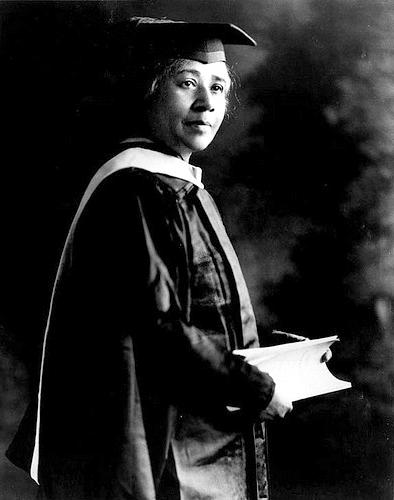
Coordinate: (-4,4)
Reasoning: Anna Julia Cooper is not as commonly known as some of the women on our list, but her ideas were some of the most radical we encountered during the course of the semester. Her focus on the unique positionality of Black Women in Society was quite radical for the time period, as she was vocal during the times of Booker T. Washington and W.E.B. DuBois, two men who were already taking up a lot of space in discussions surrounding the “Negro Problem.”
Born into slavery in 1858/9 (record disagree on the exact year), AJC came from poverty and was not afforded the privileges women like Wells and Wheatley were benefit from: connections and community. Although she was literate and went to prestigious universities in the U.S. and abroad (the French Sorbonne), AJC was never fully accepted by her other academic peers W.E.B. DuBois and Booker T. Washington. Her ideas about the uniqueness—read superiority—of Black women’s positionality within the context of pre/during/post-Civil war were quote radical and that is why she is at a 4 on the ideas axis. AJC tended to stick to classical themes in her writing, but does not plead with white people the way Phyllis Wheatley did; by using the language of the oppressor, AJC is able to push back against the dominate narrative of what it means to be a woman and what it means to be Black: stating that one can be both at the same time, and that these beings exist. Her ideas boiled down to the fact that Black women are equal to and superior than others because they are on the outskirts of society and can be more objective in their observations and the way they move in the world due to their otherness.
AJC’s methods however, were quite unradical to the point of unpopularity. Cooper believed that by teaching the classics is the way to uplift the race and ensure that they able to move about in the dominant culture. AJC doesn’t seem to subscribe to race, which isn’t radical per se due to that fact that her textual understanding is the classics which don’t refer to race, but it was a controversial opinion because she was saying this during a time of extreme racial division in the United States. We place AJC at a negative 4 for her methods, but this doesn’t necessarily mean they were bad! Some may even argue that her philosophy is more individual because it allows for Black people to think and create on their own and go out and be good moral citizens. There is no talk of religion (although she believed a Christians education was the most universal education), or economics but simply the classics.
Here’s a video detailing her life and contributions to society: